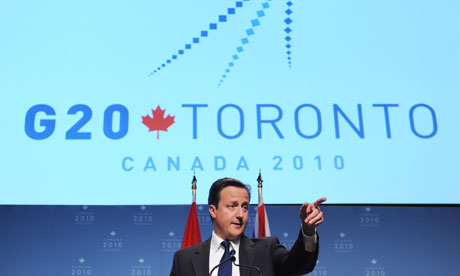Force banks to bolster capital, says BIS, as G20 is criticised for delay on reforms
Central bank's bank insists that industry revamp is urgent as campaigners voice anger that G20 failed to take harder line

Jill Treanor
Banks should be forced to bolster their capital cushions to aid economic recovery, a powerful group of central banks said today in an apparent contradiction of the G20's move to delay industry reforms.
As the Bank for International Settlements, known as the central bankers' bank, set out the case for a rise in historically low interest rates around in the developed world, it also argued that making changes to the financial system had "acquired even greater urgency".
"[The reforms] can provide the most immediate protection to the financial system in the event of a new crisis. Moreover, acting now to improve the capital base and the liquidity of bank balance sheets will not jeopardise the recovery. Rather – by making financial institutions sounder – those actions will promote a sustainable recovery," it said.
The comments in the BIS annual report came amid complaints from pressure groups that banks were being "let off the hook" by the G20 after intense lobbying by the financial sector led to a delay in introducing rules requiring them to hold more capital.
After meeting in Toronto over the weekend, the G20 leaders shelved a plan to implement tough measures this year and gave governments leeway to introduce them at their own speed. One cause of the banking crisis was that banks did not hold enough surplus capital to be able to give savers money back in the downturn. Regulators had begun to demand that banks bolster their capital cushions by raising money or cutting back on risky activities.
International regulators based in Basel, Switzerland, have urged a move to a minimum core tier 1 capital ratio – a measure of financial strength – from 2% to 4%. The Financial Services Authority has already required major banks in the UK to bump up their capital to these levels, while the Committee of European Banking Supervisors has conducted stress tests on 26 major banks, including the five biggest in the UK, in an attempt to allay concerns about the health of the system.
The results are eagerly awaited next month and while Lord Turner, chairman of the FSA, said last week that he expected UK banks to pass, it is understood that the regulator may not have the powers to publish the findings.
Even so, Robert Law, analyst at Nomura, said UK banks, which had higher capital ratios than their European counterparts, could sustain their current capital ratios if they were given three years to adapt to the new regime.
The delay is partly prompted by concerns in some countries that if banks are forced to hold more capital they will be less likely to lend, and comes amid a debate inside the UK coalition government about whether to set new lending targets for the bailed-out Royal Bank of Scotland and Lloyds Banking Group. Britain's banks commissioned work before the G20 meeting to head off the tougher rules by showing that two full percentage points could be sliced off UK economic growth by the measures proposed internationally.
Some campaigners were disappointed at the G20's inaction. Gavin Hayes, general secretary of the pressure group Compass, said: "On a whole range of different measures, the banks are being let off the hook, given that we are in the worse financial crisis for more than 60 years. It's not just capital requirements but with bonuses too.
"We are very much back to business as usual and unless we deal with the fundamental question of building capital ratios then the risk is another financial crisis years down the line."
Senior bankers are also keeping a close watch on the markets ahead of a deadline on Thursday, when European banks need to refund €442bn (£360bn) borrowed from the European Central Bank a year ago. Banks can refinance from the ECB on Wednesday , when the market will get an indication of whether the system is becoming less reliant on taxpayer support since the October 2008 banking crisis.

No comments:
Post a Comment